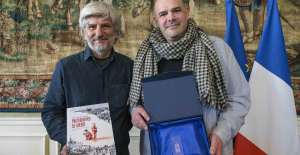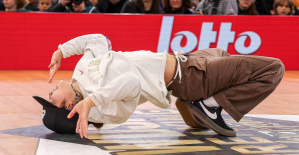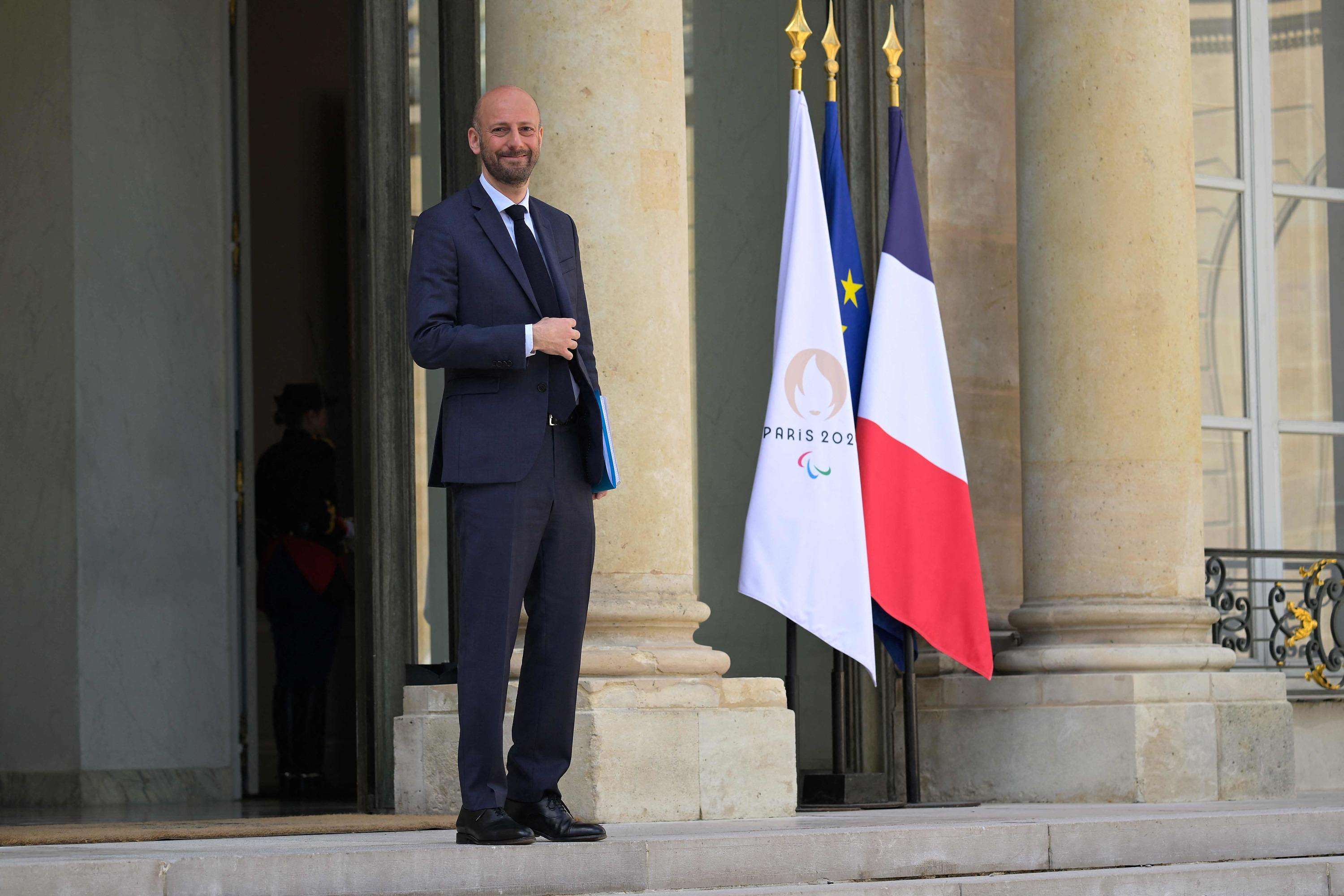What connects Ferdinand Raimund and Ödön von Horvath? Two of the most unfortunate deaths in literary history: Raimund was terrified of rabies and after an ultimately harmless dog bite clumsily shot himself in the head and died from the injuries. More than 100 years later Horvath fled from the Nazis to Paris, shortly after his arrival he was killed by a tree on the Champs-Élysées during a thunderstorm.
Away from the anecdotal, however, there are hardly any connections: Raimund's antics and magic plays are, with Johann Nestroy, the high point of Viennese popular theater at the time of the exhausted restoration and the Vormärz. Horvath's folk plays of the 20th century show the crises of the interwar period and the rise of fascism. The Burgtheater in Vienna showed how this can comment on each other with two premieres in quick succession.
Herbert Fritsch, the master of the silly and absurd, staged Raimund's magic play "The Bound Fantasy" as brightly colored stage fun. Here it bangs in, here it can be. Maria Happel plays the queen of the island Flora, she staggers swaying, her verses - "Diverse? the verses? Various verses?” – get tangled up in the rhythm, the punch line slips behind. Her court is a startled throng who shouts "Oh!" or "Ah!" and makes corresponding faces.
The stage design is as if cut by a child's hand, with large bubbles and stars, in which the islanders jump around like Teletubbies at first. Simple, but not bad, that's the kingdom in which it's like Joseph Beuys: everyone is an artist. Everything is "poetry, dance, song", as they say. This does not look like an ideal situation with Fritsch, but it is nevertheless entertaining how the court jester and court poet fight a duel of vanities in front of the assembled team.
But the evil magic sisters turn the colorful fairytale island into a dark wasteland. They also capture the imagination, the only character appearing not in a smashing 1970s flared corduroy suit, but in a suit with a briefcase. Like Mr. Bean on cocaine, Tim Werths kneels to his ears and grimaces, but has no say in the great poetry contest that will decide the island's future. Unfavorable.
Especially because the weird magic sisters (Sarah Viktoria Frick and Elisa Plüss) are now entering a candidate for their part, the harpist Nachtigall, played by Sebastian Wendelin as a screamingly funny wig diva and ideal of arrogant pseudogeniality. He is now supposed to outdo the queen's secret favorite, Amphio (Bless Amada), who hasn't uttered a verse since his muse was in chains. But in the end, a few contortions and lots of laughs later, everything turns out very differently.
Exaggerated and understretched, always slightly off the mark and therefore to the point, Fritsch demonstrates all of his directing skills with "The Bound Fantasy". He gets the applause at the premiere in a golden suit with a harp, just like Raimund: He briefly raises his hand, great calm, great excitement, a crooked chord, great laughter. That's how Fritsch ticks, the mischievous one. He lets the characters flip across the stage without rest and balance. A fast-paced game – and a rushing one.
The complete opposite with Mateja Koležnik, who staged "Kasimir and Karoline" as a dark game of inevitability. Freedom or cheerful play? Doesn't even exist in the imagination. Raimund Orfeo Voigt's stage is a narrow box with two floors, upstairs in the murky money a gas station and accident assistance center, downstairs the greenish toilets with condom machines sparkle. You think you can smell it up to the 13th row - hyper-realistic right down to the vomit slowly running down the wall.
If Fritsch is like a pinball machine, Koležnik is like a row of dominoes that all tip over one after the other – unstoppable. It begins with the dismissal of Kasimir (Felix Rech). "I like me," he calls out to his Karoline (Marie-Luise Stockinger), but she's already looking elsewhere. "Don't be so sentimental, life is hard," they say. "Dreams are foam," Kasimir has to admit at the end, his imagination is also tied - to social destiny.
Atmosphere may not arise, although it is Oktoberfest. Inflation is raging. "It will be a world war," they say. The Jews are to blame, answers another. We can't feed everyone anymore, someone adds what it all costs. We need the national, adds one. It is no longer a figure who speaks here, but the “man” of semi-public opinion. There are sentences with "one would have to" that are said as they walk up and down - mostly the paramedic from the scene of the accident - quite casually. You can ignore them if you want.
If you want, you can also overlook what is happening in the toilet wing: the woman being dragged into the corner, the prostitution, the misery. Or the horde of young men who roughly tackle the laundry of two young women. Koležnik does not exhibit such scenes, she does not even draw attention to them. Look where you want, says her strict arrangement, which is demure towards the audience. The first rows can also opt for the voyeuristic look under the skimpy skirts. You have to get the overall picture yourself – or you stick to the details, blind to the whole.
Koležnik never approaches the audience, leaving the play, which premiered in 1932, hanging in the approximate 1970s, underscored by Ana Savić-Gecan's costumes with leather jackets and houndstooth coats. The brass band plays the overture to the attack and later pogrom. All social relationships are poisoned. The fantasy that it could be different is missing. "You just don't have any vision for the future," says Karoline. At the end, the stage section closes again, there is not even the smallest gap of hope, only darkness.
In Fritsch's tavern scenes are still silly, in Koležnik's they already herald the coming disaster. It is a philosophy of history on a small scale: at the beginning of the 19th century it was still unimaginable what the shackling of social imagination would do. What Raimund could not have foreseen, Horvath was already clearly aware of. There are two artistically great evenings that Fritsch and Koležnik have built - two kinds of popular theater in Vienna, impressive in their respective differences, which surprisingly become a mutual commentary.

 B:SM will break its investment record this year with 62 million euros
B:SM will break its investment record this year with 62 million euros War in Ukraine: when kyiv attacks Russia with inflatable balloons loaded with explosives
War in Ukraine: when kyiv attacks Russia with inflatable balloons loaded with explosives United States: divided on the question of presidential immunity, the Supreme Court offers respite to Trump
United States: divided on the question of presidential immunity, the Supreme Court offers respite to Trump Maurizio Molinari: “the Scurati affair, a European injury”
Maurizio Molinari: “the Scurati affair, a European injury” Irritable bowel syndrome: the effectiveness of low-carbohydrate diets is confirmed
Irritable bowel syndrome: the effectiveness of low-carbohydrate diets is confirmed Beware of the three main sources of poisoning in children
Beware of the three main sources of poisoning in children First three cases of “native” cholera confirmed in Mayotte
First three cases of “native” cholera confirmed in Mayotte Meningitis: compulsory vaccination for babies will be extended in 2025
Meningitis: compulsory vaccination for babies will be extended in 2025 In the United States, a Boeing 767 loses its emergency slide shortly after takeoff
In the United States, a Boeing 767 loses its emergency slide shortly after takeoff The A13 motorway will not reopen on May 1
The A13 motorway will not reopen on May 1 More than 1,500 items for less than 1 euro: the Dutch discounter Action opens a third store in Paris
More than 1,500 items for less than 1 euro: the Dutch discounter Action opens a third store in Paris 100 million euros in loans, water storage, Ecophyto plan… New measures from the executive towards farmers
100 million euros in loans, water storage, Ecophyto plan… New measures from the executive towards farmers Books poisoned with arsenic present in French libraries
Books poisoned with arsenic present in French libraries New York justice returns 30 works of art looted from Cambodia and Indonesia
New York justice returns 30 works of art looted from Cambodia and Indonesia Les Galons de la BD dedicates War Photographers, a virtuoso album on the Spanish War
Les Galons de la BD dedicates War Photographers, a virtuoso album on the Spanish War Theater: Kevin, or the example of an academic failure
Theater: Kevin, or the example of an academic failure Skoda Kodiaq 2024: a 'beast' plug-in hybrid SUV
Skoda Kodiaq 2024: a 'beast' plug-in hybrid SUV Tesla launches a new Model Y with 600 km of autonomy at a "more accessible price"
Tesla launches a new Model Y with 600 km of autonomy at a "more accessible price" The 10 best-selling cars in March 2024 in Spain: sales fall due to Easter
The 10 best-selling cars in March 2024 in Spain: sales fall due to Easter A private jet company buys more than 100 flying cars
A private jet company buys more than 100 flying cars This is how housing prices have changed in Spain in the last decade
This is how housing prices have changed in Spain in the last decade The home mortgage firm drops 10% in January and interest soars to 3.46%
The home mortgage firm drops 10% in January and interest soars to 3.46% The jewel of the Rocío de Nagüeles urbanization: a dream villa in Marbella
The jewel of the Rocío de Nagüeles urbanization: a dream villa in Marbella Rental prices grow by 7.3% in February: where does it go up and where does it go down?
Rental prices grow by 7.3% in February: where does it go up and where does it go down? Even on a mission for NATO, the Charles-de-Gaulle remains under French control, Lecornu responds to Mélenchon
Even on a mission for NATO, the Charles-de-Gaulle remains under French control, Lecornu responds to Mélenchon “Deadly Europe”, “economic decline”, immigration… What to remember from Emmanuel Macron’s speech at the Sorbonne
“Deadly Europe”, “economic decline”, immigration… What to remember from Emmanuel Macron’s speech at the Sorbonne Sale of Biogaran: The Republicans write to Emmanuel Macron
Sale of Biogaran: The Republicans write to Emmanuel Macron Europeans: “All those who claim that we don’t need Europe are liars”, criticizes Bayrou
Europeans: “All those who claim that we don’t need Europe are liars”, criticizes Bayrou These French cities that will boycott the World Cup in Qatar
These French cities that will boycott the World Cup in Qatar PSG: “Immense pride in continuing the adventure in Paris”, relishes Zaire-Emery
PSG: “Immense pride in continuing the adventure in Paris”, relishes Zaire-Emery Breaking: everything you need to know about this sport
Breaking: everything you need to know about this sport NBA: Lakers gain respite, Boston responds to Miami
NBA: Lakers gain respite, Boston responds to Miami Top 14: “a very severe red card”, estimates Labit (French Stadium)
Top 14: “a very severe red card”, estimates Labit (French Stadium)

















